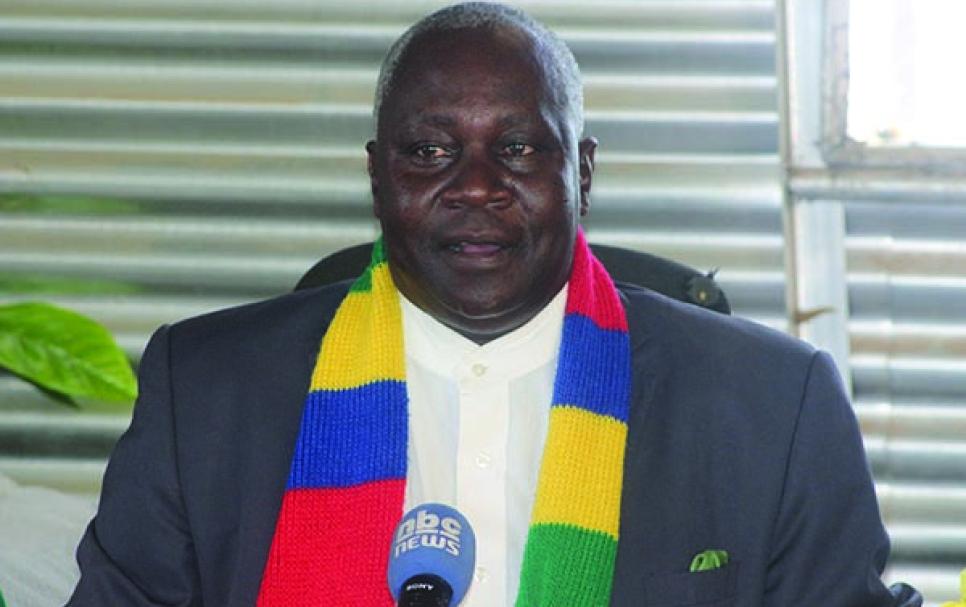Maamberua calls govt‘s N$2.5m for 3.8m ha, a bluff

By Erasmus Shalihaxwe
Former member of Parliament Usutuaije Maamberua, said plans by the Ministry of Agriculture, Water and Forestry to increase the size of land for redistribution 3.8 million hectares by 2030 on a budget of N$2.5 million is ridicules, misleading or a gross negligence by those who came up with figures.
He made these remarks during an interview with Confidente this week, while sharing his views on the ministry’s recently-tabled strategic plan 2025-2030.
The five-year plan, indicates that the government plans to acquire 3.8 million hectares of land for land distribution under the Land Reform program. This includes agricultural and commercial land, with the valuation roll in compliance with the registration.
However, the former South West Africa National Union (SWANU) president is of the opinion that it is impossible to acquire that amount of land in Namibia on such a budget. Because the prices of farms are sky rocking.
‘’N$2.5 million cannot buy a farm anywhere in Namibia, not even the smallest farm of 2,000 hectares. I think it is either an error in the announcement by the minister herself or it is a gross negligence on the part of those who made the calculations, or it is deliberate misleading of the populace…thinking that we do not know figures are all about or how things work,’’ said Maamberua.
The veteran politician stated that he spearheaded the second land conference which was held in October 2018, after convincing former President Hage Geingob that the country needs to review and revisit its land distribution policies as they are still favouring the minorities, while majorities are still experiencing land dispossession from the colonial era. Thus, if he was to advice the minister on how to deal with land issue, he would urge her to visit the recommendations from the second national land conference.
‘’The report is there and clear on what should be done. One of the strong recommendations in that report is that within two years after the report is released, a specific law on the ancestral land must be enacted in parliament…but so far nothing has been done. What I would advise is that the minister, instead of coming up with new strategies…she must implement what is recommended by the report,’’ stated Maamberua.
Last week, land reform minister Inge Zaamwani, motivated in parliament that the new land bill represents a consequential step forward, one that seeks to consolidate progress, confront persistent challenges, and reaffirm the government collective resolve to deliver equitable access to land for Namibians. As the bill represents more than just a policy proposal, a strategic framework with the potential to unlock opportunities for both the communal and commercial areas, she noted.
"The Bill is a reflection of the aspirations of the people as clearly articulated through the resolutions of the second national land conference, which was marked by a remarkable sense of unity of purpose. Where participants spoke with one voice, a voice that called for peaceful, pragmatic, and people-centered land reform process.
‘’Some of the new changes introduced by this consolidated legislation which include, among others the consolidation of all existing legislation into a single, unified Land Act, governing land matters, a centralised Land Tribunal, ensuring that all land-related disputes are adjudicated by one institution, establishment of a Communal Land Development Fund to support development in communal areas, while maintaining the Land Acquisition and Development Fund (LADF) for commercial agricultural land development, especially resettlement farms,’’ Zaamwani stated.
She further announced that the new Land Bill will prohibited the acquisition of both communal and commercial land by foreign nationals, introduce stringent measures to address non-compliance and collusion. It will provide for the establishment of Land Committees to issue consent letters in areas without recognised Traditional Authorities or where disputes exist among such authorities.
However, chairperson of the Council of Traditional Authorities, chief Immanuel /Gaseb, said the new land bill plans to take away powers from traditional authorities on communal land matters, leaving them without a say on issues affecting their communities. He accused government of trying to play both roles in traditional land matters.
‘’The government is also now becoming the traditional authority like in Tanzania where they do not have traditional authorities, we were never consulted on this new land bill,’’ lamented /Gaseb.
- 13 views










Comments